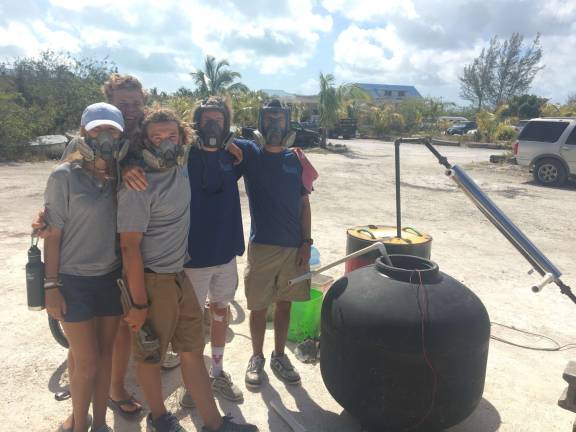In an old keg, turning plastic into diesel

Sibley Dickinson and Jenna Gersie
A Gen Z solution to our pernicious habit
Before they have showered for breakfast, still wet from early morning ocean swims or sweaty from runs, students at The Island School complete their chores. “Resources!” one shouts as five students split up and enter each building to collect bright green plastic bins. The bins originally held used cooking oil on cruise ships; the oil was then donated to The Island School to create biodiesel for use in campus vehicles. The tops were cut off the plastic containers, which now serve as waste receptacles.
One student rides a tricycle to the center of campus—there are two wheels in the front, with a plywood surface constructed above the wheels—and the others pile the bins on the vehicle. Together, the resources team heads to The Tingum Center, located in a garage bay at the campus’s Center for Sustainable Development. The Tingum Center is filled with giant sacks for sorted waste, or, as it is known at The Island School, “resources.” Students unload the green bins from the trike and begin sorting the materials into the labeled sacks: biohazard, glass, aluminum and cans, paper and cardboard, landfill (used only as a last resort), recyclable plastics, other plastics.
Plastics. Prolific and pernicious, plastic is a dangerously ordinary material—our shoes, our watches, our 93 percent nylon athletic shorts are all made from plastic. Even the recycled-plastic T-shirts Patagonia is famous for have negative repercussions, shedding off microplastics with every wash. Plastic is created from fossil fuels, but a foreigner to the dirt it once came from, it will not fully decompose for hundreds to thousands of years. And we’ve all seen enough videos of sea turtles chomping on plastic bags or seabirds caught in six-pack rings to know the disastrous impacts of plastics on marine environments.
Here on Eleuthera, a remote island in The Bahamas, plastic is as plentiful as fish in the sea, and it’s not easy to get rid of. Shipping plastics to the nearest recycling facility in Nassau wastes fuel; moreover, freight fees make it more attractive to the average islander to simply dump the packaging from that G.I. Joe in a landfill for free. So Eleuthera is marked by a smell characteristic of many developing countries: burning plastic.
Of course, the best practices for managing waste are prevention, minimization, and reuse. But acknowledging that even the most conscious consumers still pick up a plastic spoon or a bottle of Gatorade every now and then, and with recycling out of the picture on a remote island, students at The Island School turn to energy recovery, or fostering waste into a usable energy source.
Enter pyrolysis, the thermal decomposition of a material in an atmosphere of high heat and low oxygen. If you heat plastic in this type of environment, the hydrocarbon bonds in the plastic will break, releasing gases that can be cooled into usable fuel. This synthetic fuel could contribute to running the school’s fleet of vehicles, as well as generators when the inevitable hurricane hits.
Led by their fearless research advisors, seven Island School students engineered and constructed a pyrolyzer. For long hours in the hot Bahamas sun, the research group used PVC piping, a water jug, an old beer keg, air pressure storage tanks from their dive center, and other recycled materials to angle grind and weld a usable pyrolyzer.
Their vessel constructed, the research team collected milk jugs, yogurt containers, Styrofoam, and other pyrolyzable waste plastics labeled 2, 4, 5, or 6. (Plastics with these resin identification codes account for about three-fourths of plastic waste on campus.) With these plastics, they produced synthetic diesel, comparable to standard diesel fuel based on density, calorific value, and emissions.
The student-built pyrolyzer can produce 5.7 gallons of synthetic diesel from every 60 pounds of plastic waste, and when blended with the biodiesel already produced on campus, the school saves money on island-priced gas and rids the campus of plastic waste in an environmentally conscious way.
“We developed a working model that can convert our waste plastic into usable fuel,” said Alex Perkins, environmental engineer and sustainability teacher at The Island School. “Now our goal is to increase the efficiency of the reaction.”
While turning plastic into fuel seems like a miracle, the ugly truth is that plastic is still plastic, and we wouldn’t have to pyrolyze it in the first place if we reused it, or better yet, if manufacturers stopped individually wrapping those slices of American cheese. But until plastic production stops completely, Island School students and their teachers will continue to work toward revolutionizing waste management.